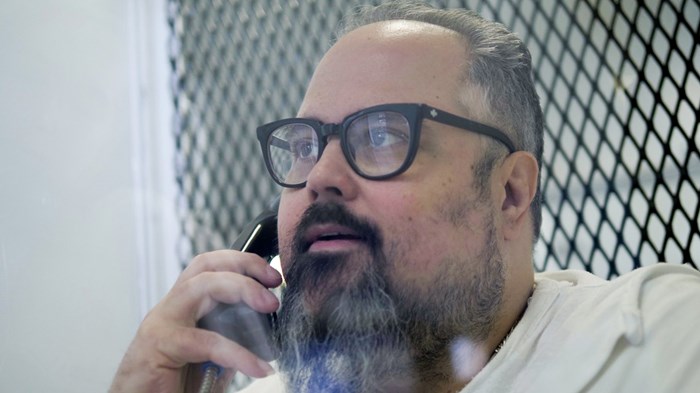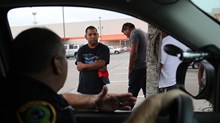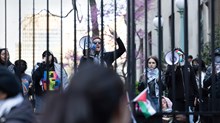
Update (October 26, 2023): A few hours before Will Speer’s scheduled execution on Thursday, the Texas Court of Criminal Appeals stayed his death pending further review of his case. Speer has presented several legal claims, including that his counsel did not provide mitigating evidence.
---------------
The first death row prisoner to help lead a death row ministry in Texas’s Allan B. Polunsky Unit, a state prison with maximum security units, is scheduled to be executed on Thursday, October 26. On Tuesday, Texas denied Will Speer’s application for clemency.
Every morning, Speer leads prayer and worship—sometimes delivering a sermon through prison radio—on death row. Though the men are in solitary confinement for 22 hours of the day, they can still sing together through the walls, said pastor Dana Moore, who has spent years ministering to those on death row in the Polunsky Unit.
In 2021 the Texas Department of Criminal Justice started an 18-month faith-based program for 28 death row inmates who passed an application process. The program became known as the “God Pod,” consisting of classes, worship, and rare fellowship for those normally in solitary confinement.
Speer graduated from the program this year and became the first “inmate coordinator” for the God Pod program, which meant he could teach classes and mentor others in prison despite being on death row.
Speer was convicted of murdering Jerry Collins when he was 16 and was sentenced to life in prison as an adult. Then, a decade later in 2001, he was convicted of murdering a fellow prisoner, Gary Dickerson—he says the murder was to get gang protection in prison—and was sentenced to death.
He argues that mitigating information was not shared with juries. He testifies to a horrific childhood of repeated abuse and violence, and to being sent to a hospital as an adult after a severe beating in prison. His highest level of education was eighth grade. Speer has expressed remorse for his crimes and was baptized behind bars in 2022.
The only surviving immediate family member of Dickerson, whose murder resulted in Speer receiving a death sentence, said she did not want Speer to be executed. Sammie Gail Martin submitted a letter to the Texas Board of Pardons and Paroles asking that Speer’s sentence be commuted to life in prison.
“I have spent much time reflecting on what justice my brother and family deserve,” she wrote. She said she believed Speer was remorseful and “has something left to offer the world.” If he received a life sentence, “hopefully he can continue to help others and make amends for his past crimes.”
J. C. Collins, the son of victim Jerry Collins, told the Baptist Standard that he would attend the execution, but in order to pray for Speer. “I don’t want to see him die,” he said.
“I know what I robbed from them and their families,” Speer told the Baptist Standard. “I understand, because I’ve been there. The stepfather who abused me killed my mother. I know what it feels like. I can’t restore what I took away from them. But maybe I can give back some other way.”
Speer’s attorney Amy Fly stated that if Speer was allowed to spend the rest of his natural life in prison, he would join the Texas field ministry program, which involves more seminary training than the God Pod program and makes the incarcerated graduates de facto prison chaplains.
Ministry programs available on death row vary state by state. Official prison chaplains have the most access, ministry leaders say. Evelyn Lemly, the CEO of Kairos Prison Ministry, said their death row ministry programs generally depend on whether the facility allows them in.
But more “peer” ministry is happening at prisons now. When those behind bars are leading ministry, it allows the incarcerated population to have more access to ministry, since chaplains are stretched to cover an entire prison population and outside visitors are limited.
“It’s increasingly common,” said Michael Hallett, a researcher who has studied the religious lives of long-term prisoners at the Louisiana State Penitentiary, also known as Angola. He has followed prisoner-led ministry programs in Texas and Louisiana.
Critics of prisoner-led ministry say “it’s just a way for Texas to spend less money on prisons by putting inmates in as de facto chaplains,” Hallett told CT, adding that chaplains have more training and certification in things like crisis intervention and grief counseling.
But these “peer” ministries do “bring great comfort to prisoners,” he added.
“Many times, prisoners are better able to relate to one another than to outside volunteers,” he said. “It eliminates the shame factor and allows for very genuine and open conversations.”
Those behind bars need visits from the outside, too, reminding those in prison that “they’re not forgotten,” Southern Baptist pastor Dana Moore told CT.
Moore, who leads Second Baptist Church in Corpus Christi, Texas, has ministered to others on the same death row with Speer. He was part of a US Supreme Court case a few years ago, where prisoner John Henry Ramirez had asked prison officials to allow Moore to lay hands on him at his execution. The Supreme Court ruled in Ramirez’s favor.
Moore laid hands on the chest of Ramirez when he was executed in October 2022. He’s now ministered on death row for six years and finds the biggest difference from his regular ministry is that, apart from the execution, he can never shake hands with or hug the men he’s talked to for years. They speak through a phone with plexiglass between them. He mostly listens to them and hears how they are doing, and they often talk about God or a sermon.
Ministering to men who are eventually executed “is a toll,” he said, especially with the flurry of last-minute court decisions. Moore also visited with Jedidiah Murphy, who was executed in Texas earlier this month. He says he is pro-life, and therefore against the death penalty and abortion. People in his church might not agree with him, but “they’re supportive” of his approach, and some volunteer in a Kairos prison ministry program. In his sermon this past Sunday, he told his church that each of them know a condemned prisoner: Jesus.
Hallett said the Texas faith-based programs are valuable, but they need to be “more ecumenical” so they are not coercive. Becoming a field minister in Texas prisons, for example—a program where long-term prisoners receive training to be de facto prison chaplains—happens through the Heart of Texas Foundation, a Christian organization. (Texas Monthly reported that the God Pod included Buddhists, Muslims, and an Odinist.)
“The Christians there, they’re vocal but they’re not overbearing with it,” said Moore, the Baptist pastor.
States other than Texas and Louisiana have unofficial ministries led by prisoners themselves. In Tennessee, Kevin “KB” Burns became an ordained pastor while on death row and wrote materials on incarceration for the Christian Community Development Association. He does not currently have an execution date, and Tennessee executions are currently paused while the state resolves issues with its lethal injection protocol. Burns has worked as a chaplain’s assistant, according to one pastor who has regularly visited him, and goes cell to cell praying with men on death row.
Burns maintains his innocence but was convicted in 1995 of the two felony murders of Damond Dawson, 17, and Tracey Johnson, 23.
Pastor Kevin Riggs of the nondenominational Franklin Community Church has visited Burns for years and said his church elders agreed to ordain him after observing how he was already ministering to others on death row. That ordination process took place over two years of training, and now Burns is listed on the church’s staff webpage as its “minister on death row.”
But outside ministers are the ones present for execution. Stacy Rector, a Presbyterian Church (USA) pastor in Tennessee, visited a man on death row, Steve Henley, for ten years. Visitation rules for death row are complicated in Tennessee and require a lot of paperwork and patience, Rector said.
“For anybody thinking about doing this work, this ministry, there has to be a commitment level to it, because there needs to be consistency for the men and women,” she said. “It’s life for them. But you also have to have boundaries.”
Henley, convicted of killing a couple in 1985, was executed in 2009, with Rector present for his death as his spiritual advisor. Rector is now the head of Tennesseans for Alternatives to the Death Penalty.
In the time she has ministered on death row, she has seen how “unconditional love from God and other people” can profoundly change those who are incarcerated, people who maybe didn’t have that love or time to reflect on the outside. But she also now appreciates more deeply, from more exposure to victims’ families, “the absolute devastation that homicides cause.”
“It’s a scale we’re trying to balance that is not balance-able,” she said. The family of Henley, the executed man she knew, is also struggling. “The ripple effects of this thing are everywhere.”
Whatever happens in Speer’s case, on Tuesday elsewhere in Texas, Moore, the Baptist pastor, was setting up his visits for the month to the men on death row.
“We’re remembering them,” he said.
This article has been updated with the current administrator of the field ministry program, Heart of Texas Foundation, and to reflect that Texas denied Speer’s clemency application on Tuesday afternoon.

Support Our Work
Subscribe to CT for less than $4.25/month


















